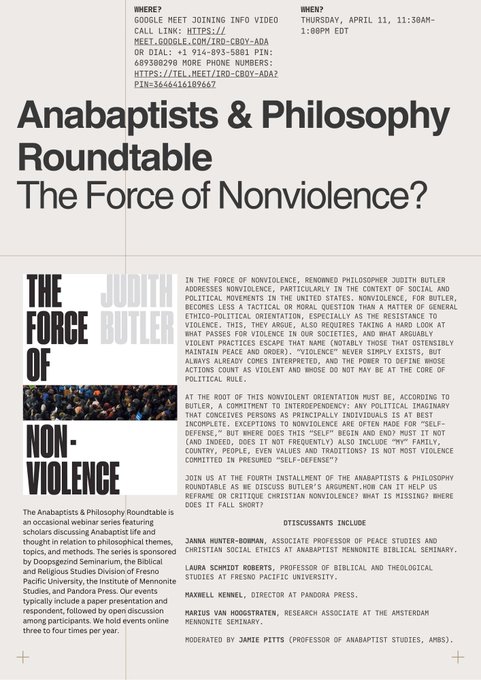A special journal issue of the Conrad Grebel Review on Anabaptists and Philosophy has just been published, and it is packed full of contributions I’m proud to be connected with, including an article that summarizes and extends my Mennonite work fromthepastfew years. See here for a PDF of the issue (and please note that although the issue year is listed as 2022, it was just published now in 2024).

Guest editor Laura Schmidt Roberts and editor Kyle Gingerich Hiebert write that:
“This special issue of The Conrad Grebel Review comprises the proceedings from the first two sessions of the Anabaptists & Philosophy Roundtable, an occasional webinar series established in 2022 featuring scholars discussing Anabaptist life and thought in relation to philosophical themes, topics, and methods. The roundtable is sponsored by Doopsgezind Seminarium in Amsterdam, the Biblical and Religious Studies Division of Fresno Pacific University, the Institute of Mennonite Studies at Anabaptist Mennonite Biblical Seminary, and Pandora Press. I am grateful to Laura Schmidt Roberts, Professor of Biblical and Theological Studies at Fresno Pacific University and member of the organizing committee for acting as guest editor of this issue.”
They also write that
Maxwell Kennel’s essay challenges the narrow field of interlocuters Anabaptism engages, pressing for intentional engagement with secular and philosophical voices from within and outside of the tradition. Methodologically, Kennel finds the tradition itself provides resources for such a broadened, risky engagement in its both/and, neither/nor “third way” identity and practices, even as many within the theological stream fear loss or amendment of long-held convictions and practices may result. Readers encounter poignant questions that probe apparent fears of difference. Christian Early’s response affirms Kennel’s interest in “risky engagement” with voices external to Anabaptism for the way these might clarify and enrich convictions, observing the risk entails more honest dialogue born of self-awareness and openness to not knowing how the conversation will end, including the possible amendment or overturning of convictions. In the case of philosophy, Anabaptism’s scant engagement provides substantial opportunity, the pluriform and undetermined nature of which should be preserved as a space for ongoing exploration and testing. In particular, Early applauds Kennel’s concern for “the inner world” of the affective and psychological, challenging readers to consider how fear, anxiety, or resentment of the other can shape responses to difference that retreat to the safety of tradition instead of risking open, underdetermined engagement.
The Anabaptists and Philosophy Roundtable materials can be found here, and our next event is described on the poster below, with meeting details here: Apr 11 · 11:30–1:00 EDT Google Meet: https://meet.google.com/ird-cboy-ada

The opening article in the special issue is by philosopher Diane Enns, and it is called “The Reluctant Mennonite: Reflections on an Ambiguous Inheritance.” Following on her earlier work in an essay titled “For the Love of Paradox: Mennonite Morality and Philosophy,” it offers a brilliant reflection on her philosophy and autobiography, with a response from John Caruana.
My essay “Anabaptism contra Philosophy” is next, and I’m really happy with how it recaps and extends my work on the topic from the past ten years. See below for a PDF:
Next is Christian Early’s generous response to my article, “The Anabaptist Tradition: Intellectual Problems, Resources, and Possible Conversations,” which he frames by saying:
My response to Maxwell Kennel’s stimulating and provocative paper is in the mode of “yes-and,” drawing out directional lines for future conversations, imagining into possibilities, and at points, asking for clarification. I will not push back directly on what Kennel says in his paper because I wholeheartedly agree with the overall project of inviting risky engagement with voices from outside the Anabaptist tradition. In fact, that project animates my own work and offers a vision for the kind of intellectual work in which one might engage as an Anabaptist academic, and to which one might constructively contribute. Engaging voices on the margins and from the outside and working with dissonance are central ideas to what an Anabaptist philosopher might “do,” and I commend Kennel for articulating them so clearly. This does not mean that I agree with everything Kennel says, but rather that it seems more constructive to expand on what he says in additional directions and to engage conversationally, requesting clarification at places where I register more hesitation.
After that is an excellent polemic from Tyler B. Davis that takes Nigel Biggar to task for his egregious defence of colonialism. And the book reviews section includes evaluations of two of the first books I edited and published with Pandora Press back in 2022: The newest Mennonite-Catholic dialogue volume, and Ron Tiessen’s novel Menno in Athens, which Margaret Atwood has praised on Twitter/X, saying:
The reviewer, Charlie Roth, writes that
“To read it is to see correspondences and to ask questions… that may produce tremors in the ground of a naïve faith. So be it. Difficult questions and honest answers are essential in the transition to maturity, in faith as in everything.”
And the issue concludes with my review of Elizabeth Phillips’ book Apocalyptic Theopolitics – which includes criticisms I hope will be helpful and constructive rather than diminishing for the project of Political Theology as it responds to violence.
